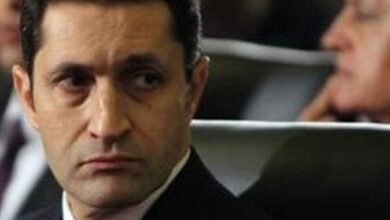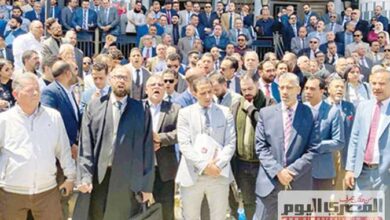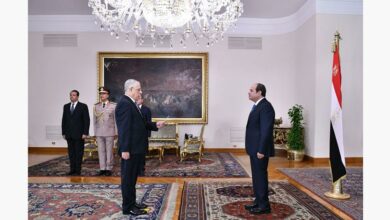The third session of Hosni Mubarak’s trial provoked outrage among lawyers representing those killed in the revolution, after the testimonies of prosecution witnesses fell short of proving that Mubarak and his men were responsible for killing hundreds of demonstrators.
On Monday, Mubarak, his former interior minister Habib al-Adly, and six of the latter’s aides stood trial on grounds of killing at least 846 protesters during the 18-day-uprising that culminated in the toppling of the 83-year-old former ruler. During the ten-hour-long session, Justice Ahmed Refaat listened to the testimonies of four police officers from the Central Security Forces (CSF) division. Although the public attorney presented these policemen as prosecution witnesses, their testimonies — with the exception of that of the first witness — worked in favor of the defendants.
The first witness, Gen. Hussein Mohamed Moussa, the head of the CSF Communications Department, said he heard Ahmed Ramzy, the head of the CSF and one of Al-Adly’s aides on trial, saying that there would be attacks on the headquarters of the Interior Ministry and on police stations. Mousssa aid that Ramzy then decided unilaterally to arm policemen with automatic weapons and live ammunition. Moussa denied that Al-Adly gave any orders to kill protesters. This same witness confessed in court that he was sentenced earlier to two years in prison by another court for destroying a CD that contained recordings of communications between senior police officers during the revolution.
The second witness, Emad Badry, another CSF officer, said that Ramzy ordered policemen to exercise self-restraint and only use tear gas and pellets. The third witness Captain Bassem Mohamed Hassan said that he was ordered to shoot pellets in the air or at protesters’ feet in case the crowd tried to break in the Interior Ministry. As to the fourth, Major Mahmoud Galal Abdel Hamid, he said that he was ordered to only use tear gas and batons to stop protesters. There was no mention of Mubarak’s involvement in attacks on protesters.
Such testimonies do not concur with human rights reports alleging that unarmed protesters were shot by policemen and snipers with live ammunition aiming at critical parts of the body, such as the chest and head.
Gamal Eid, executive director of the Arab Network for Human Rights Information and one of the victims’ lawyers, accused the public prosecutor of presenting unreliable witnesses to the court.
“The investigations [conducted by the prosecutor’s office] are weak and imprecise,” said Eid. “The witnesses that the prosecutor presented would acquit rather than lead to the conviction of Mubarak and Al-Adly.”
Eid seized the opportunity to reiterate his call for the sacking of Public Prosecutor Abdel Meguid Mahmoud, who was originally appointed by Mubarak.
“We won’t have real justice as along as this prosecutor is in office,” he said.
However, Eid's colleague Amir Salem, who was at the trial also representing the revolution’s victims, offers a different account.
“The prosecutor’s interrogations were not weak,” said Salem, adding that all four witnesses had given a different testimony to the prosecutor during the investigations. The representatives of the public prosecution were as “shocked” as the victims’ lawyers at seeing witnesses recant their original testimonies yesterday, added Salem.
The witnesses might have been pressured or tempted to provide contradictory testimony, alleged Salem.
Mubarak’s trial has attracted wide local and international media coverage since it began on 3 August. During the first two sessions, which were aired on state-owned television, Egyptians were swept by disbelief and joy at seeing their former president and his two sons Gamal and Alaa inside the dock.
“If these serial killers get acquitted, I expect a second and violent wave of the revolution,” warned Eid. “People’s anger will not be controllable then.”
In a separate case, Mubarak and his two sons stand trial on grounds of corruption and profiteering. The trial is set to resume on Wednesday with more witnesses testifying.
“If I were presiding over this case, I would not need to listen to a lot of witnesses,” said Mahmoud al-Khodairy, former vice-president of Egypt’s Court f Cassation. “Because the matter is clear. Mubarak, Al-Adly and the top police officers are the ones with a vested interest in killing protesters.”
“People cannot accept a punishment less than the execution of Mubarak and Al-Adly,” added Al-Khodairy who presided over a mock trial of Mubarak in Tahrir Square in the spring. The crowd then had demanded the execution of the ousted president.
But Al-Khodeiry downplayed the impact of the changes in testimony offered by witnesses, explaining that the judge has the right to rule according to the original testimonies they gave to the general prosecutor if he feels they have lied to the court.
Monday’s hearings were marred by violence, both inside and outside the courtroom. Clashes erupted between lawyers from opposing sides after one of Mubarak’s attorneys raised his picture inside the court. The two parties reportedly exchanged insults and threw bottles and shoes at each other.
Meanwhile, the confrontation intensified between Mubarak loyalists and martyrs’ families who rallied outside the Police Academy, where the trial is being held. The two sides scuffled and hurled stones at each other, leaving 25 people injured.
Earlier in the day, the CSF had violently dispersed the families of protesters killed in the revolution, chasing them away from the academy. Police also chased away those injured in the clashes who tried to speak with journalists.
Similar clashes had taken place during previous court sessions. However, before yesterday, there had been no violence inside the courtroom at the Mubarak trial, and many are blaming the police for the lack of security in the courtroom.
According to Al-Khodairy, the police are to blame for allowing Mubarak loyalists to walk into the courtroom with banners and photographs of Mubarak.
Besides the violence, lawyers representing the martyrs and their families complained that the judge had mistreated them and did not give them the same opportunity as the defendants’ lawyers to speak or ask questions of witnesses.
“We respect the judge and trust his integrity, but we do not understand why we are being mistreated,” said Eid.
In the first two sessions, the performance of the victims’ lawyers was dismissed by most observers as disappointing. Many were pushing and shoving each other to speak into the microphone and appear on camera. Some had even made ridiculous arguments, such as the claim that Mubarak had died in 2004 and that the man lying in bed inside the cage was not him.
Some analysts warned that such performances would cause the judge to take the victims' lawyers less seriously as a whole.
Justice Refaat’s decision to stop live broadcasts of the trial after the second session was believed to be partially related to his desire to discourage fame-seeking lawyers from showing up.
“The criticism of the victims’ lawyers was exaggerated,” Eid said in defense of his colleagues. “Yesterday, there were more than 150 of them and they were amazing.”
On his part, Salem dismissed the way Justice Refaat treated the victims’ lawyers as inappropriate, adding: “You cannot mistreat all lawyers just because some of them have caused trouble.”




